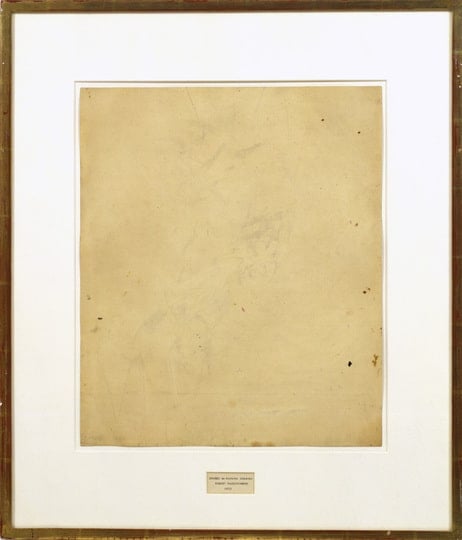
Still "something", no matter what Tim O'Brien says — Erased de Kooning Drawing by Rauschenberg / SFMOMA
Quick: Think about nothing … nope, not “think about thinking about nothing” — just think about nothing at all. Should be easy, right?
(And no cheating, like concentrating on your breathing or concentrating on stillness. Breathing is a thing, and stillness is an attribute of things. Something must be to be still. Stillness without reference to anything, now that’s hard to think about.)
No really, try it. Thought experiments only work in the trying. It’s okay, I’ll wait.
So have you done it?
No? Why not? How hard can it be?
As it turns out, thinking about nothing is tricky business.
A few weeks back, Tim O’Brien posted on a NPR article about nothing, Two Ways to Think About Nothing, with his own, “A Careful Look at ‘Nothing’” in which he threw down the gauntlet for yours truly to write something about nothing. Despite the success of a show about nothing, it’s deceptively hard to talk or think about.
But wait, you say, I know how to talk about nothing: “There’s nothing to eat.” “I have nothing to wear.” “That turned out nothing like I had planned.” But in these cases, nothing has been made safe for thinking; it’s been corralled into the space between two or more somethings. But nothing itself — naked nothing — that’s hard. It’s confusing. And we get to it mainly by negation, by recognizing what it’s not, which can feel bewildering.
Take, for instance, Elijah’s experience recounted in 1 Kings:
The LORD said, “Go outside and stand on the mountain before the LORD; the LORD will be passing by.” A strong and heavy wind was rending the mountains and crushing rocks before the LORD — but the LORD was not in the wind. After the wind there was an earthquake — but the LORD was not in the earthquake. After the earthquake there was fire — but the LORD was not in the fire. After the fire there was a tiny whispering sound.
The God of everything comes to Elijah, and he hears almost nothing. God who is beyond all that is comes in silence. But in order to hear God, Elijah first needed to learn what not to listen to — to pay attention not to the nothing that was something, but to the nothing Who was Someone.


